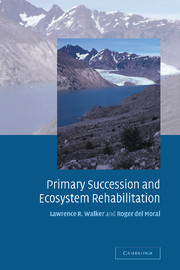Book contents
- Frontmatter
- Contents
- Preface and acknowledgements
- 1 Introduction
- 2 Denudation: the creation of a barren substrate
- 3 Successional theory
- 4 Soil development
- 5 Life histories of early colonists
- 6 Species interactions
- 7 Successional patterns
- 8 Applications of theory for rehabilitation
- 9 Future directions
- Glossary
- Illustration credits
- References
- Index
9 - Future directions
Published online by Cambridge University Press: 08 January 2010
- Frontmatter
- Contents
- Preface and acknowledgements
- 1 Introduction
- 2 Denudation: the creation of a barren substrate
- 3 Successional theory
- 4 Soil development
- 5 Life histories of early colonists
- 6 Species interactions
- 7 Successional patterns
- 8 Applications of theory for rehabilitation
- 9 Future directions
- Glossary
- Illustration credits
- References
- Index
Summary
Paradigm shifts
During the twentieth century, the study of succession has experienced a series of transformations. The dominant view between 1900 and 1950 described succession as progressive and deterministic. In this view, rugged pioneers changed the raw earth to facilitate the invasion of more advanced life forms, a process that reached its climax when only the best-adapted, largest and most persistent species survived. Stable communities were believed to develop reliably and to display emergent qualities not discernible among the individual components. Observations of chronosequences on the landscape were used extensively because of the assumption that the present repeats the past. A complex, rigorous and internally consistent philosophy was built on what we have come to see as a generally erroneous assumption.
A concurrent view, which gained favor only after mid-century, held a less optimistic and more reductionist view of succession. According to this alternative, succession was an individualistic, population-based process in which inhibitory and facilitative processes were equally likely to dominate. This shift in perspectives has gone from a belief in strict determinism to one in which stochastic behavior borders on chaos. More recently, modeling has suggested that some prediction of succession may be possible. Patterns have emerged, if not at the species level, then in terms of functional attributes. The search for assembly rules continues but prediction of entire successional trajectories remains elusive.
Traditional reliance solely on observation and logic has given way during the past 30 years to experimentation.
- Type
- Chapter
- Information
- Primary Succession and Ecosystem Rehabilitation , pp. 328 - 342Publisher: Cambridge University PressPrint publication year: 2003



